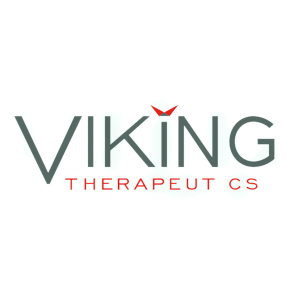Viking Therapeutics Announces Positive 52-Week Histologic Data from Phase 2b VOYAGE Study of VK2809 in Patients with Biopsy-Confirmed Non-Alcoholic Steatohepatitis (NASH)
Rhea-AI Summary
Viking Therapeutics has announced positive 52-week histologic data from its Phase 2b VOYAGE study of VK2809 in patients with biopsy-confirmed NASH. VK2809 demonstrated significant efficacy across key endpoints: up to 75% of treated patients achieved NASH resolution with no worsening of fibrosis, and up to 57% showed a ≥1-stage improvement in fibrosis without worsening of NASH. The safety profile was consistent with earlier results, with most adverse events being mild or moderate. The results also showed substantial reductions in liver fat content and plasma lipids, indicating potential cardio-protective benefits.
Positive
- Up to 75% of VK2809-treated patients achieved NASH resolution with no worsening of fibrosis.
- Up to 57% of VK2809-treated patients achieved ≥1-stage improvement in fibrosis with no worsening of NASH.
- VK2809-treated patients showed up to 48% achieving both NASH resolution and a ≥1-stage improvement in fibrosis.
- Significant reductions in liver fat content at Week 52, ranging from 37% to 55%.
- Reduction in plasma lipids including LDL-C by 20% to 25%.
- Low rates of GI disturbances and treatment-related adverse events.
- Consistent efficacy signal observed across various sensitivity analyses.
Negative
- One treatment-related serious adverse event reported, a patient with psychiatric disorder experiencing symptom worsening.
- Drug-related GI adverse events were reported in 18.5% of patients.
- Not all treatment arms achieved statistically significant improvement in plasma levels of ALT and AST compared to placebo.
News Market Reaction
On the day this news was published, VKTX declined 9.70%, reflecting a notable negative market reaction.
Data tracked by StockTitan Argus on the day of publication.
Up to
Up to
Up to
Adverse Events, Including GI-Related AEs, Similar Among VK2809-Treated Patients vs. Placebo at Week 52; Consistent with Prior Data Reported at Week 12
Conference Call Scheduled for 8:00 a.m. ET Today
Histologic Results at 52 Weeks
On the secondary endpoint of NASH resolution with no worsening of fibrosis, VK2809-treated patients demonstrated NASH resolution ranging from
On the secondary endpoint evaluating improvement in fibrosis with no worsening of NASH, VK2809-treated patients demonstrated improvement in fibrosis ranging from
On the secondary endpoint evaluating the proportion of patients experiencing both resolution of NASH and improvement in fibrosis, VK2809-treated patients demonstrated improvement ranging from
Placebo (n = 41) | VK2809 1 mg QD (n = 14)4,5 | VK2809 2.5 mg QD (n = 52) | VK2809 5 mg QOD (n = 27)5 | VK2809 10 mg QOD (n = 44) | VK2809 (n=137) | |
Resolution of | 29.3 % | (p=0.0215)6 | (p=0.0023) | (p=0.0091) | (p=0.0001) | (p<0.0001) |
Fibrosis | 34.1 % | (p=0.1543) | (p=0.4414) | (p=0.0304) | (p=0.0497) | (p=0.0308) |
Resolution of | 19.5 % | (p=0.0856) | (p=0.0508) | (p=0.0206) | (p=0.0115) | (p=0.0032) |
Notes: 1) Resolution of NASH defined as NAS inflammation score of 0-1, ballooning score of 0. 2) Includes all patients with baseline and post-baseline MRI, and Week 52 biopsy. 3) No worsening of NASH defined as no increase from baseline in ballooning, inflammation, or steatosis. 4) Reduced size cohort intended to identify a minimally effective dose. 5) Enrollment suspended at approximately |
Study results were consistent under various sensitivity analyses. A more conservative sensitivity analysis, which categorized subjects with missing data as non-responders, produced similar statistical outcomes. These analyses demonstrate the robustness of the efficacy signal observed in this study.
Placebo (n = 57) | VK2809 1 mg QD (n = 17)4,5 | VK2809 2.5 mg QD (n = 59) | VK2809 5 mg QOD (n = 36)5 | VK2809 10 mg QOD (n = 56) | VK2809 (n=168) | |
Resolution of | 21.1 % | (p=0.0406)6 | (p=0.0002) | (p=0.0256) | (p<0.0001) | (p<0.0001) |
Fibrosis | 24.6 % | (p=0.2615) | (p=0.0850) | (p=0.0979) | (p=0.0159) | (p=0.0101) |
Resolution of ≥ 1-stage | 14.0 % | (p=0.1302) | (p=0.0072) | (p=0.0440) | (p=0.0034) | (p=0.0009) |
Notes: 1) Resolution of NASH defined as NAS inflammation score of 0-1, ballooning score of 0. 2) Includes all patients with baseline and post-baseline MRI, and Week 52 biopsy, with missing data imputed as non-response. 3) No worsening of NASH defined as no increase from baseline in ballooning, inflammation, or steatosis. 4) Reduced size cohort intended to identify a minimally effective dose. 5) Enrollment suspended at approximately |
"These data provide compelling evidence of VK2809's efficacy in patients with biopsy-confirmed NASH and fibrosis," stated Brian Lian, Ph.D., chief executive officer of Viking. "Treatment with VK2809 led to statistically significant improvements across key histologic endpoints, including fibrosis, which supports the value of thyroid hormone receptor beta agonism as an important mediator of disease. Consistent with prior results, VK2809 demonstrated an excellent tolerability profile in this study, with low rates of GI disturbances and treatment related adverse events. The VOYAGE results further indicate VK2809's best-in-class profile and we look forward to sharing the full results at a future medical meeting."
Reduction in Liver Fat Content at 52 Weeks
As reported previously, patients receiving VK2809 demonstrated statistically significant reductions in liver fat at Week 12, which was the primary endpoint in VOYAGE. Importantly, patients receiving VK2809 continued to demonstrate statistically significant reductions in liver fat content at Week 52, with the mean relative change from baseline ranging from
Placebo (n = 48) | VK2809 1 mg QD (n = 14)4,5 | VK2809 2.5 mg QD (n = 55) | VK2809 5 mg QOD (n = 27)5 | VK2809 10 mg QOD (n = 49) | |
Mean baseline | 20.4 % | 21.7 % | 20.3 % | 18.4 % | 21.5 % |
Mean relative | -12.8 % | - (p=0.0060) | - (p<0.0001) | - (p<0.0001) | - (p<0.0001) |
Median relative | -9.3 % | -34.3 % | -54.2 % | -46.7 % | -56.3 % |
Percentage of | 27.1 % | (p=0.0116) | (p<0.0001) | (p=0.0002) | (p<0.0001) |
Notes: Data from patients who received a baseline and week 52 MRI. 1) Least squares mean percent change from baseline using an Analysis of Covariance (ANCOVA) model. 2) p-value vs. placebo. 3) p-value vs. placebo using logistic regression model. 4) Reduced size cohort intended to identify a minimally effective dose. 5) Enrollment suspended at approximately |
Reduction in Plasma Lipids at Week 52
Consistent with prior studies, patients receiving VK2809 demonstrated placebo-adjusted reductions in LDL-C ranging from
Safety and Tolerability
VK2809 demonstrated encouraging safety and tolerability in this study through 52 weeks of treatment, with minimal differences compared with the previously reported results at 12 weeks. The majority (
Placebo (n = 65) | VK2809 1 mg QD (n = 17) | VK2809 2.5 mg QD (n = 66) | VK2809 5 mg QOD (n = 37) | VK2809 10 mg QOD (n = 61) | VK2809 (n=181) | |
Treatment (number of | 51 (78.5 %) | 14 (82.4 %) | 55 (83.3 %) | 29 (78.4 %) | 58 (95.1 %) | 156 (86.2 %) |
Drug-related | 22 (33.8 %) | 7 (41.2 %) | 13 (19.7 %) | 9 (24.3 %) | 24 (39.3 %) | 53 (29.3 %) |
TEAEs leading to | 6 (9.2 %) | 2 (11.8 %) | 1 (1.5 %) | 2 (5.4 %) | 6 (9.8 %) | 11 (6.1 %) |
Drug-related GI | 12 (18.5 %) | 4 (23.5 %) | 3 (4.5 %) | 1 (2.7 %) | 7 (11.5 %) | 15 (8.3 %) |
Nausea | 5 (7.7 %) | 2 (11.8 %) | 2 (3.0 %) | 1 (2.7 %) | 3 (4.9 %) | 8 (4.4 %) |
Diarrhea | 2 (3.1 %) | 3 (17.6 %) | 2 (3.0 %) | 1 (2.7 %) | 3 (4.9 %) | 9 (5.0 %) |
Notes: Study safety population, defined as all patients who were randomized and received at least one dose of study drug. 1) Deemed by investigator as possibly, probably, or definitely related to study drug. |
After 52 weeks, plasma levels of alanine aminotransferase (ALT) and aspartate aminotransferase (AST) were reduced in every treatment arm receiving VK2809 compared with patients receiving placebo, though not all treatment arms achieved statistically significant improvement vs. placebo. Levels of thyroid hormones such as thyroid stimulating hormone (TSH), free thyroxine (fT4), and free triiodothyronine (fT3) were relatively unchanged among VK2809-treated patients compared to patients receiving placebo. Changes in vital signs, including blood pressure, heart rate, and body weight were similar among patients receiving VK2809 as compared to patients receiving placebo.
Study Design
The VOYAGE study was a randomized, double-blind, placebo-controlled, multicenter, international trial designed to assess the efficacy, safety and tolerability of VK2809 in patients with biopsy-confirmed NASH and fibrosis. Enrollment included patients with at least
Conference Call Today at 8:00 a.m. ET
Viking will hold a conference call today at 8:00 a.m. ET to discuss the top-line results from the Phase 2b VOYAGE study of VK2809. To participate on the conference call, please dial 844-850-0543 from the
About VK2809
VK2809 is an orally available, tissue and receptor-subtype selective agonist of the thyroid hormone beta receptor (TRβ) that possesses selectivity for liver tissue, as well as the beta receptor subtype, suggesting promising therapeutic potential in a range of lipid disorders. The compound recently completed the Phase 2b VOYAGE study in patients with biopsy-confirmed non-alcoholic steatohepatitis (NASH) and fibrosis, successfully achieving both the trial's primary and secondary endpoints. VK2809 also successfully achieved primary and secondary endpoints in a Phase 2a study for the treatment of patients with elevated LDL-C and non-alcoholic fatty liver disease (NAFLD). Selective activation of the thyroid hormone beta receptor in liver tissue is believed to favorably affect cholesterol and lipoprotein levels via multiple mechanisms, including increasing the expression of genes associated with lipid metabolism and clearance.
About Viking Therapeutics, Inc.
Viking Therapeutics, Inc. is a clinical-stage biopharmaceutical company focused on the development of novel first-in-class or best-in-class therapies for the treatment of metabolic and endocrine disorders, with three compounds currently in clinical trials. Viking's research and development activities leverage its expertise in metabolism to develop innovative therapeutics designed to improve patients' lives. Viking's clinical programs include VK2809, a novel, orally available, small molecule selective thyroid hormone receptor beta agonist for the treatment of lipid and metabolic disorders. The compound successfully achieved both the primary and secondary endpoints in a recently completed Phase 2b study for the treatment of biopsy-confirmed non-alcoholic steatohepatitis (NASH) and fibrosis. In a Phase 2a trial for the treatment of non-alcoholic fatty liver disease (NAFLD) and elevated LDL-C, patients who received VK2809 demonstrated statistically significant reductions in LDL-C and liver fat content compared with patients who received placebo. Viking is also developing VK2735, a novel dual agonist of the glucagon-like peptide 1 (GLP-1) and glucose-dependent insulinotropic polypeptide (GIP) receptors for the potential treatment of various metabolic disorders. Data from a Phase 1 and a Phase 2 trial evaluating VK2735 (dosed subcutaneously) for metabolic disorders demonstrated an encouraging safety and tolerability profile as well as positive signs of clinical benefit. The company is also evaluating an oral formulation of VK2735 in a Phase 1 trial. In the rare disease space, Viking is developing VK0214, a novel, orally available, small molecule selective thyroid hormone receptor beta agonist for the potential treatment of X-linked adrenoleukodystrophy (X-ALD). VK0214 is currently being evaluated in a Phase 1b clinical trial in patients with the adrenomyeloneuropathy (AMN) form of X-ALD. Viking holds exclusive worldwide rights to a portfolio of five therapeutic programs, including VK2809 and VK0214, which are based on small molecules licensed from Ligand Pharmaceuticals Incorporated.
For more information about Viking Therapeutics, please visit www.vikingtherapeutics.com.
Forward-Looking Statements
This press release contains forward-looking statements regarding Viking Therapeutics, Inc., under the safe harbor provisions of the
![]() View original content to download multimedia:https://www.prnewswire.com/news-releases/viking-therapeutics-announces-positive-52-week-histologic-data-from-phase-2b-voyage-study-of-vk2809-in-patients-with-biopsy-confirmed-non-alcoholic-steatohepatitis-nash-302162714.html
View original content to download multimedia:https://www.prnewswire.com/news-releases/viking-therapeutics-announces-positive-52-week-histologic-data-from-phase-2b-voyage-study-of-vk2809-in-patients-with-biopsy-confirmed-non-alcoholic-steatohepatitis-nash-302162714.html
SOURCE Viking Therapeutics, Inc.







